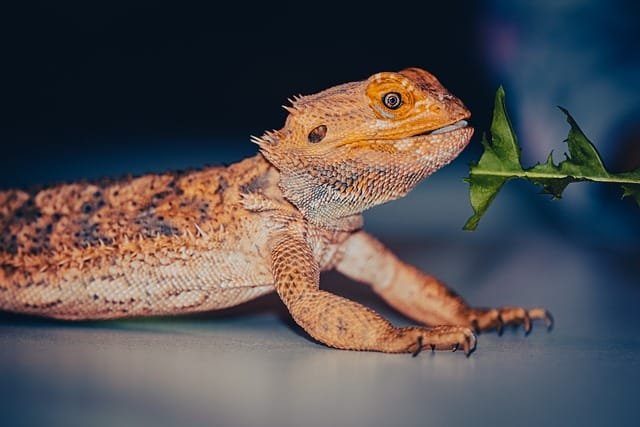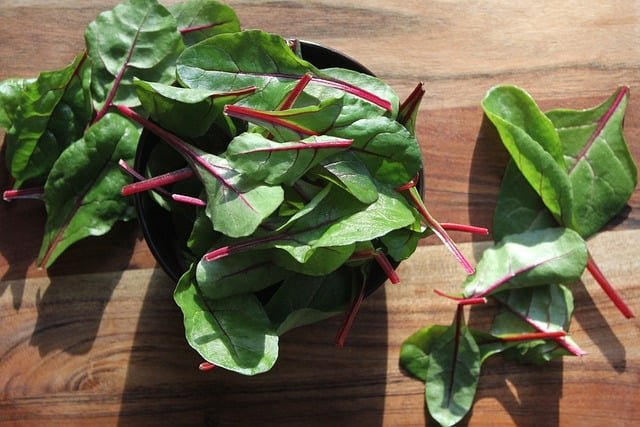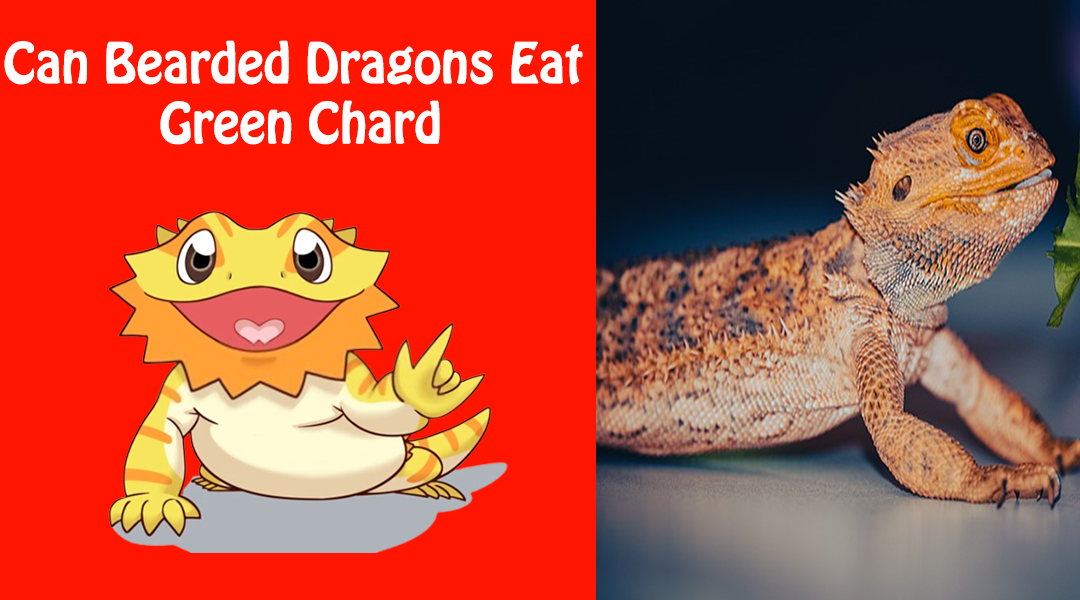Bearded dragons are known to be omnivores, meaning they can eat both plant and animal matter. However, not all fruits and vegetables are safe for them to consume. One commonly asked question by bearded dragon owners is whether or not they can eat green chard. In this article, we will provide a clear and concise answer to this question, backed by reliable sources and expert opinions.
To begin, it is important to understand the nutritional needs of bearded dragons. They require a balanced diet that includes a variety of protein sources, leafy greens, and vegetables. Green chard is a leafy green that is high in vitamins and minerals, making it a potentially beneficial addition to a bearded dragon’s diet. However, not all leafy greens are safe for bearded dragons to eat, and some may even be harmful. We will explore the potential benefits and risks of feeding green chard to bearded dragons in the following paragraphs.

Understanding Bearded Dragons’ Diet
Bearded dragons are omnivorous, which means they eat both plant and animal matter. In the wild, their diet consists of insects, small mammals, and a variety of plants. In captivity, it’s important to provide a balanced diet that meets their nutritional needs.
When it comes to feeding your bearded dragon, it’s important to offer a variety of foods to ensure they get all the nutrients they need. A diet that is too low in certain nutrients can lead to health problems, such as metabolic bone disease.
Some of the foods that can be included in a bearded dragon’s diet are:
- Insects (such as crickets, mealworms, and dubia roaches)
- Vegetables (such as kale, collard greens, and squash)
- Fruits (such as berries and melons)
- Commercial bearded dragon pellets
It’s important to note that some foods should be fed in moderation or avoided altogether. For example, spinach and other high-oxalate vegetables should only be fed occasionally, as they can interfere with calcium absorption. Additionally, fruits should be offered sparingly, as they are high in sugar.
When feeding your bearded dragon, it’s important to provide a balanced diet that meets their nutritional needs. By offering a variety of foods and avoiding those that can cause health problems, you can help ensure your bearded dragon stays healthy and happy.
Can Bearded Dragons Eat Green Chard?
Green chard is a leafy vegetable that belongs to the same family as beets and spinach. It is a good source of vitamins A, C, and K, as well as minerals such as iron, calcium, and potassium. While it is safe for humans to eat, can bearded dragons eat green chard?
The answer is yes, bearded dragons can eat green chard. It is a nutritious vegetable that can be included in their diet. However, it should be fed in moderation as it contains oxalic acid, which can bind to calcium and prevent its absorption. This can lead to metabolic bone disease in bearded dragons.
It is important to note that green chard should not be the main component of a bearded dragon’s diet. It should be offered as a part of a varied diet that includes other leafy greens, vegetables, and insects. Additionally, it should be thoroughly washed and chopped into small pieces to prevent choking hazards.
In summary, bearded dragons can eat green chard but it should be fed in moderation as part of a varied diet. As with any new food, it is important to introduce it slowly and monitor your pet for any adverse reactions.
Benefits of Green Chard for Bearded Dragons
Green chard is a nutritious leafy vegetable that can be a great addition to a bearded dragon’s diet. Here are some of the benefits of feeding green chard to your bearded dragon:
- Rich in vitamins and minerals: Green chard is a good source of vitamins A, C, and K, as well as minerals like calcium and iron. These nutrients are essential for maintaining a healthy bearded dragon.
- Low in oxalates: Unlike some other leafy greens, green chard is relatively low in oxalates, which can bind to calcium and prevent its absorption. This makes it a good choice for bearded dragons who need calcium in their diet.
- Easy to prepare: Green chard is easy to prepare and serve. Simply wash the leaves thoroughly and chop them into small pieces before feeding them to your bearded dragon.
- Variety in diet: Adding green chard to your bearded dragon’s diet can help provide variety and prevent boredom. Bearded dragons enjoy a varied diet and feeding them different foods can help keep them healthy and happy.
Overall, green chard is a nutritious and easy-to-prepare vegetable that can be a great addition to your bearded dragon’s diet.
Potential Risks of Green Chard for Bearded Dragons
Green chard, also known as Swiss chard, is a nutritious leafy green vegetable that can be a good addition to a bearded dragon’s diet. However, there are some potential risks to be aware of when feeding green chard to your bearded dragon.
Firstly, green chard contains oxalates, which can bind to calcium and prevent its absorption in the body. This can lead to calcium deficiency and metabolic bone disease in bearded dragons. Therefore, it is important to feed green chard in moderation and ensure that your bearded dragon is getting enough calcium from other sources.
Secondly, green chard is high in fiber, which can cause digestive problems in some bearded dragons. Overfeeding green chard can lead to diarrhea, bloating, and other gastrointestinal issues. It is recommended to introduce green chard slowly into your bearded dragon’s diet and monitor their digestive health.
Lastly, green chard can also contain pesticides and other harmful chemicals if not grown organically. It is important to wash green chard thoroughly and choose organic sources whenever possible to minimize the risk of exposure to harmful substances.
Overall, green chard can be a healthy addition to a bearded dragon’s diet if fed in moderation and with caution.

How to Feed Green Chard to Bearded Dragons
When it comes to feeding bearded dragons, it’s important to offer a variety of fresh vegetables to ensure they receive a balanced diet. One vegetable you may be considering is green chard. Here’s what you need to know about feeding green chard to your bearded dragon.
Nutritional Value
Green chard is a nutritious vegetable that contains a variety of vitamins and minerals. It’s a good source of vitamin A, vitamin C, vitamin K, and calcium. However, it’s also high in oxalates, which can bind to calcium and prevent it from being absorbed by the body. This means that while green chard can be a healthy addition to your bearded dragon’s diet, it should be fed in moderation.
Preparing Green Chard
Before feeding green chard to your bearded dragon, it’s important to prepare it properly. Start by washing the leaves thoroughly to remove any dirt or debris. Then, chop the leaves into small, bite-sized pieces. You can also remove the stems if you prefer, as they can be tough and difficult to digest.
Feeding Green Chard
When feeding green chard to your bearded dragon, it’s important to remember that it should only be offered in moderation. Aim to feed it no more than once or twice a week, and only in small quantities. You can offer it as part of a salad mix with other vegetables, or as a standalone treat.
Overall, green chard can be a healthy addition to your bearded dragon’s diet when fed in moderation. Just be sure to prepare it properly and offer it in small quantities to avoid any potential health issues.
Alternatives to Green Chard for Bearded Dragons
When it comes to feeding our bearded dragons, it’s important to offer a variety of nutritious foods to keep them healthy and happy. While green chard is a great option, it’s always good to mix things up and provide different types of greens and vegetables. Here are some alternatives to green chard that you can offer your bearded dragon:
Collard Greens
Collard greens are a great alternative to green chard as they are high in calcium and other essential nutrients. They are also low in oxalates, which can inhibit the absorption of calcium. Collard greens are easy to find in most grocery stores and can be fed raw or cooked.
Mustard Greens
Mustard greens are another great option for bearded dragons. They are high in vitamin A and other essential nutrients. Mustard greens can be fed raw or cooked and can be found in most grocery stores.
Turnip Greens
Turnip greens are a nutritious leafy green that can be fed to bearded dragons. They are high in calcium and other essential nutrients. Turnip greens can be fed raw or cooked and can be found in most grocery stores.
Dandelion Greens
Dandelion greens are a great alternative to green chard as they are high in calcium and other essential nutrients. They are also low in oxalates, which can inhibit the absorption of calcium. Dandelion greens can be found in most grocery stores or can be harvested from your backyard if you have a pesticide-free lawn.
Squash
Squash is a great alternative to leafy greens for bearded dragons. It is high in vitamin A and other essential nutrients. Squash can be fed raw or cooked and can be found in most grocery stores.
By offering a variety of nutritious foods, you can ensure that your bearded dragon is getting all the essential nutrients they need to thrive.
Conclusion
In conclusion, green chard can be a healthy addition to a bearded dragon’s diet. It is a good source of vitamins and minerals, especially calcium, which is essential for healthy bones and overall health. However, as with any new food, it is important to introduce it gradually and in small amounts to avoid digestive upset.
When feeding green chard to your bearded dragon, it is important to wash it thoroughly to remove any dirt or pesticides. You should also remove any stems or tough parts, as these can be difficult for your pet to digest.
While green chard is generally safe for bearded dragons, it should not be the only food in their diet. A balanced diet for a bearded dragon should include a variety of vegetables, fruits, and insects. It is also important to provide a source of UVB lighting and a proper temperature gradient in their enclosure to ensure optimal health.
Overall, green chard can be a healthy and nutritious addition to a bearded dragon’s diet when fed in moderation and as part of a balanced diet.

Frequently Asked Questions
What fruits can bearded dragons eat?
Bearded dragons can eat a variety of fruits, but it is important to remember that fruits should only be given as occasional treats due to their high sugar content. Some fruits that are safe for bearded dragons to eat include strawberries, raspberries, blueberries, blackberries, mangoes, and papayas.
What veggies can bearded dragons eat every day?
Bearded dragons require a diet that is high in leafy greens and vegetables. Some safe options for daily feeding include collard greens, mustard greens, turnip greens, kale, dandelion greens, and butternut squash.
What can bearded dragons not eat?
There are several foods that should never be fed to bearded dragons, including avocado, rhubarb, spinach, and beet greens. These foods can be toxic and cause serious health problems for your pet.
Can bearded dragons eat arugula?
Arugula is safe for bearded dragons to eat in moderation, but it should not be a staple in their diet. It is high in oxalic acid, which can bind to calcium and prevent it from being absorbed properly.
Can bearded dragons eat zucchini?
Zucchini is a safe vegetable for bearded dragons to eat in moderation. It is low in oxalic acid and high in nutrients like vitamin C and potassium.
What greens can Beardies not have?
Bearded dragons should avoid eating greens that are high in oxalic acid, such as spinach, Swiss chard, and beet greens. These foods can bind to calcium and prevent it from being absorbed properly, which can lead to health problems like metabolic bone disease.

I, Mark Antonelli am highly interested in pet care tips. The experiences I gained through university life in animal sciences were also helpful to identify the best tricks for caring for and feeding varying kinds of pets. I know the majority of people love to own a pet. Yet, there is a guilty of owing a Bearded Dragon due to a lack of information about how much friendly and peaceful they are. I thought of filling this gap with detailed writings about this Pogona genus Bearded Dragon. All my team is also giving me great support to fulfil my mission. Hope you will enjoy the journey with us.

